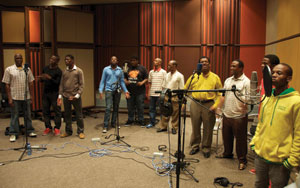
Ladysmith Black Mambazo at a tracking session at KZM Music House in Durban, South Africa
Photo courtesy of Martin Walters
Grammy Award–winning South African a cappella group Ladysmith Black Mambazo recently released Always With Us, a tribute honoring the music of Nellie Shabalala, the late wife of Black Mambazo’s founder and leader, Joseph Shabalala. Nellie passed away in 2002 and was considered the group’s matriarch. It is the first album in the group’s recording history of more than 40 years to feature female Zulu vocalists singing traditional songs. “This album comes from deep inside my heart,” says Joseph Shabalala. “It might be more personal than anything we have shared with the world before.”
Always With Us, comprising 10 tracks, is built around a collection of songs that Nellie recorded with her own singing group from the township church that she and her husband founded. The members of Black Mambazo added their vocals to the original recordings over several sessions that took place in 2011 and 2012 at KZM Music House in Durban, South Africa, and while touring in the U.S., visiting Club Shmed Studios in Missoula, Mont., and East Hall Recording in Fayetteville, Ark.
Joseph Shabalala says, “It was important for us to not just record these songs, but to create beautiful music. From the first day we worked with Nellie’s recordings to the final day when we knew we were finished, our primary objective was to make a collection of beautiful songs.”

Engineer Martin Walters at KZM Music House in Durban, South Africa
Photo courtesy of Martin Walters
Engineer Martin Walters was chosen to record the group at those South African and U.S. locales, and then mix the new tracks with Nellie’s original recordings. Walters is based in Jonesborough, Tenn., where he owns and operates Big Time Audio (bigtimeaudio.com). His credits include Patti LaBelle, Spyro Gyra, Esperanza Spalding, Emmylou Harris, Grover Washington Jr., Freddie Hubbard, Kirk Whalum, Dave Koz, Richard Elliot, and many others. Walters began his long association with Ladysmith Black Mambazo while doing work for the Heads Up International label, mixing their album Wenukeyla (2003). Walters won a Grammy Award in 2008 for Best Traditional World Music Album for Black Mambazo’s Ilembe: Honoring Shaka Zulu.
“Joseph’s ideas worked beautifully with the original tracks, intertwining his voice with Nellie’s, and weaving Mambazo’s voices tastefully with the women,” Walters says. “The only surviving audio of Nellie singing that we could acquire was taken from three demo CDs of her group, Women of Mambazo, and her church choir members. No multitrack version was available. Songs were in stereo rough mix form with lots of reverb in the mix, creating the challenge of isolating Nellie’s voice as much as possible, adding the voices of Mambazo and maintaining a good balance between the group and the lead vocal.
“The first part of the process was to listen critically to the recordings and determine which songs would be the most feasible to work with.” Walters notes. “Some of the songs were traditional South African call and response, which were the easiest to work with for me as I could lift the lead vocal and adjust the group up or down for a better blend with Mambazo. On other songs we had to take a more creative approach. We had to come up with vocal arrangements that worked well musically with the other singers for each song. This was accomplished by adding extended harmonies to the background vocals or doubling the background harmonies with the male voices, or composing antiphonal parts. The arrangement of some of the songs allowed us to drop the original tracks out and add new sections with just Mambazo, or trading back and forth between the two groups.
“Our first experiment with the tracks began at Club Shmed Studios in Missoula, Montana,” Walters continues. “The group was performing at the University [of Montana] and had a rare couple of days off in between concerts, so their manager, Mitch Goldstein, flew me out and we recorded a first pass of Mambazo to allow them to listen and work out the vocal arrangements. It was impossible to be particular about the equipment used, as it was difficult enough to find available studios large enough to accommodate a group of this size. The next time we got together was at KZM Music House in Durban, South Africa. By this time Joseph Shabalala had worked out most of the vocal arrangements with Mambazo.” He says that at KZM Music House they tracked to an Avid/Digidesign ICON console into Pro Tools 10 HD using various mic pre’s, and that he did “some additional tweaking” during Mambazo’s next U.S. tour, at East Hall Recording in Fayetteville, Ark.
“I had to pack my MacPro to take to the studio in Arkansas,” Walters remembers, “and the airlines managed to take it out of the case, remove the six inches of foam and bubble wrap, and drop it from what appeared to be a considerable height. At least this prompted me to finally upgrade my Pro Tools HD 3 Accel rig, which I had been putting off.”
Finally, Walters mixed their tracks with Nellie’s original tracks in his facility. He mixed in the box using Pro Tools 10 HD; Waves, McDSP, URS and iZotope plug-ins (among others), listening through Mackie HR824 and Genelec 1039 monitors.
“Nellie was not just Joseph’s wife,” says Albert Mazibuko, a Ladysmith Black Mambazo member since 1969. “She was a mother, sister-in-law or cousin to every member of the group. She helped us at home in so many ways while we were traveling the world. In Zulu, we have a phrase, ‘Uyohlale Unathi,’ which means ‘someone who is no longer with us in body but stays with us in spirit.’ Singing with Nellie on these songs gave us peace and allows us to honor her life.”



